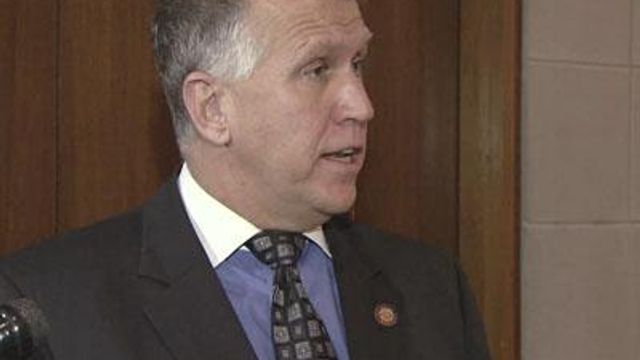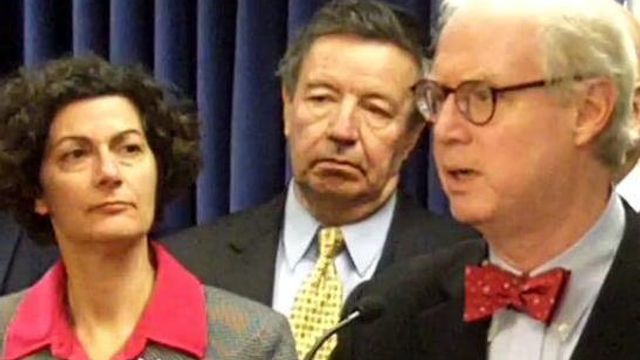House overrides NCAE bill veto in unprecedented midnight session
In an unprecedented move early Thursday, the North Carolina General Assembly voted to hold a special legislative session after midnight for veto overrides, prompting a sharp rebuke from Democratic Gov. Bev Perdue.
Posted — UpdatedIn an unprecedented move early Thursday, the North Carolina General Assembly voted to hold a special legislative session after midnight for veto overrides, prompting a sharp rebuke from Democratic Gov. Bev Perdue.
Perdue said the Republican-controlled legislature's actions were unconstitutional.
The House voted 69-45 to override the governor's veto of Senate Bill 727, which stops the North Carolina Association of Educators from collecting dues from teachers' paychecks via payroll deduction.
The day's veto session was limited by the state constitution to consideration of Perdue’s veto of Senate Bill 9, the Racial Justice Act repeal. The Senate overrode that veto handily. But the House failed to muster the needed Democratic votes, so the measure was sent to a committee for further study.
House Republicans and Democrats reportedly agreed that S9 would be the only bill debated in the special veto session. But GOP leaders reneged on the deal, opting instead to amend an adjournment resolution to call themselves back into yet another special session after midnight to take up other veto overrides.
The move wasn’t confirmed by GOP leaders till 11:15pm. The surprise session was scheduled for 12:45am, just 90 minutes later.
House Democrats, already in the minority, tried but failed to derail the gambit, calling out Republicans for failing to give public notice that other bills would be taken up.
“These bills were debated extensively during session. They’ve had full vetting,” responded House Rules chairman Tim Moore, R-Cleveland. “Whenever the will of the majority is to pass legislation without further delay, we should move forward.”
“Do you think 1:05 AM is a good time for the public to participate in this debate?” asked Paul Luebke, D-Durham.
“No time is better than the present,” Moore replied.
“The public is totally cut out of the debate here.” Luebke retorted. “It’s really a shameful way for us to do business in the General Assembly.”
In the Senate, GOP leaders had already decided they wouldn’t take up any veto overrides after midnight. But debate raged over whether the Senate should approve the resolution allowing the House to do so.
Senator Josh Stein, D-Wake, said the move was “a disgrace to this institution and to the 9 and a half million people in this state.”
House leaders had considered override votes on the Voter ID bill (H351) and the drilling/fracking bill (S709), even passing out talking points on those bills. But in the end, the only veto they had the votes to override was that of a bill removing the right of members of the NC Association of Educators to have their dues collected automatically from their paychecks.
The Senate had overridden the veto earlier this summer. The House found enough votes to follow suit, in part because five Democrats were absent due to illnesses, deaths in the family, and foreign travel.
Two Democrats joined the GOP to give them the needed override margin – Reps. Jim Crawford, D-Granville, and Bill Brisson. NCAE lobbyist Brian Lewis said afterward Brisson told him he’d had to make a trade-off to save the Racial Justice Act, but Tillis denied any such deal was made, and Brisson was unavailable for comment.
Lewis said his group will challenge the law in court. He and some Democrats say the measure is unconstitutional because it singles out one group as the subject of punitive legislative action. Other groups with dues checkoff privileges were not targeted.
Tillis defended the post-midnight session. “Some people that probably don’t like the fact we’re here tonight. But the fact of the matter is we got it done, we’re out of here, we’re saving money and going back home.”
“I’ve made it very clear from the beginning that that unfinished business will be taken up when we have the opportunity to override the vetoes,” Tillis said. “Everybody should know. The public should know, or any of the vested interests.”
It’s not clear how the public would know lawmakers would vote on other veto overrides besides S9. None was on today’s agenda. But Tillis said it shouldn’t have come as a surprise. “Everybody knows that anytime we come into a general session, that those matters are on the calendar, and this should be a learning experience.”
Tillis didn’t deny that that “general session” wasn’t announced until nearly midnight, but he says it was conducted under the standing rules of the House.
Another reporter asked whether the House under Tillis’s leadership is transparent.
“I think so,” Tillis answered. “Far more than any one that I’ve served under.”
House and Senate Dems were joined by party chairman David Parker for a 1:45am press conference to respond to the late-night session.
Parker called the night’s events “pure chicanery.” And Rick Glazier, D-Cumberland, called them “a sham and a shame.”
Democrats said the late-night session was unconstitutional and unethical, and would poison the little bipartisanship left in this legislative session.
“When people make agreements and then break them within a matter of hours,” said Ray Rapp, D-Madison, “trust is gone.”
Watch the raw video at right.
Copyright 2024 by Capitol Broadcasting Company. All rights reserved. This material may not be published, broadcast, rewritten or redistributed.






